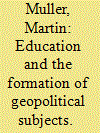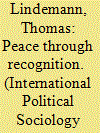| Srl | Item |
| 1 |
ID:
102951


|
|
|
|
|
| Publication |
2011.
|
| Summary/Abstract |
This paper is intended to compare the subjective experiences of two sets of veterans, one having taken part in the ANC's struggle against apartheid (1980-1990) and the other having joined the Fatah uprisings of 1987 against Israel. The apartheid system has been entirely dismantled and the ANC now governs South Africa. The Palestinians, by contrast, remain under Israeli control, and the Palestinian Liberation Organisation has failed to create an independent Palestinian state. And yet, surprisingly, ANC activists tend to see themselves as victims, while those of Fatah usually see themselves as heroes. I shall offer the hypothesis that the heroization or victimization of self is drawn from a collective political imagination and is related to the construction of self-esteem.
|
|
|
|
|
|
|
|
|
|
|
|
|
|
|
|
| 2 |
ID:
102948


|
|
|
|
|
| Publication |
2011.
|
| Summary/Abstract |
Despite the crucial role of schools and universities in shaping the worldviews of their students, education has been a marginal topic in international relations. In a plea for more engagement with the power and effects of education, this paper analyzes the interplay of discipline and knowledge in the formation of geopolitical subjects. To this end, it employs material from ethnographic research at the Moscow State Institute of International Relations, the premier university for educating future Russian elites in the field of international relations. The paper draws on Foucault to chart the ensemble of disciplinary practices producing "docile bodies" and objective knowledge and traces how these practices are bound up with the geopolitical discourse of Russia as a great power: while they fashion the great power discourse with objectivity, disruptions in the discourse also disrupt disciplinary practices.
|
|
|
|
|
|
|
|
|
|
|
|
|
|
|
|
| 3 |
ID:
102950


|
|
|
|
|
| Publication |
2011.
|
| Summary/Abstract |
Human rights originated as a political claim made by movements contesting state power. Recently, they have become the property of states: a juridical right that is for the state to give. I track this transformation through changes in responses to humanitarian crises. Humanitarian crises are seen to issue from two sorts of states-rogue states and failed states-both of whom violate, by commission or omission, the rights of their subjects. Given the failure of these states to protect the rights of their citizens, policymakers and rights advocates call for external intervention, or state-building. In understandings of state-building, human rights are for the state; or more correctly the state-being-built; to give, reversing the development of human rights from a set of political movements that protested unjust state power.
|
|
|
|
|
|
|
|
|
|
|
|
|
|
|
|
| 4 |
ID:
102952


|
|
|
| 5 |
ID:
102949


|
|
|
|
|
| Publication |
2011.
|
| Summary/Abstract |
The interdiction and detention of irregular arrivals has become one of the key means by which wealthy states enforce and promote secure mobility. This article presents a detailed genealogy of the problems and solutions that enabled Australia's Christmas Island to become an integral site for the reproduction of Australian society through practices of border protection. A close examination of Christmas Island reveals broader, deeper currents that follow the shifting shapes of state internationally, and the dreams and ruins such transformations produce in their wake.
|
|
|
|
|
|
|
|
|
|
|
|
|
|
|
|